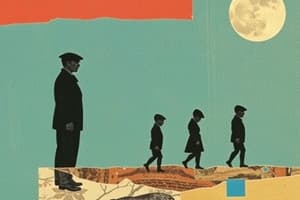Podcast
Questions and Answers
Which of the following stages of development, according to Erik Erikson, is characterized by the development of independence and self-confidence?
Which of the following stages of development, according to Erik Erikson, is characterized by the development of independence and self-confidence?
What is the primary focus of Jean Piaget's Cognitive Development Theory?
What is the primary focus of Jean Piaget's Cognitive Development Theory?
Which stage of development, according to Lawrence Kohlberg, is characterized by the development of moral reasoning and values?
Which stage of development, according to Lawrence Kohlberg, is characterized by the development of moral reasoning and values?
During which stage of development, according to Erik Erikson, does the individual explore their identity and roles?
During which stage of development, according to Erik Erikson, does the individual explore their identity and roles?
Signup and view all the answers
What is the primary focus of developmental psychology?
What is the primary focus of developmental psychology?
Signup and view all the answers
According to Jean Piaget, which stage of cognitive development is characterized by egocentrism and symbolic thinking?
According to Jean Piaget, which stage of cognitive development is characterized by egocentrism and symbolic thinking?
Signup and view all the answers
Which of the following is NOT a stage of development according to Erik Erikson?
Which of the following is NOT a stage of development according to Erik Erikson?
Signup and view all the answers
During which stage of development, according to Jean Piaget, does the individual develop logical thinking?
During which stage of development, according to Jean Piaget, does the individual develop logical thinking?
Signup and view all the answers
Which theorist is associated with the development of attachment styles?
Which theorist is associated with the development of attachment styles?
Signup and view all the answers
What is the primary focus of Lawrence Kohlberg's Moral Development Theory?
What is the primary focus of Lawrence Kohlberg's Moral Development Theory?
Signup and view all the answers
Study Notes
Developmental Psychology
Definition
Developmental psychology is the scientific study of human development across the lifespan, including cognitive, social, and emotional development.
Key Theories
- Erik Erikson's Psychosocial Theory: 8 stages of development, each with a unique psychosocial crisis that must be resolved.
- Jean Piaget's Cognitive Development Theory: 4 stages of cognitive development, focusing on how children construct knowledge and understanding.
- Lawrence Kohlberg's Moral Development Theory: 6 stages of moral development, emphasizing the development of moral reasoning and values.
Stages of Development
- Infancy (0-1 year):
- Sensorimotor stage (Piaget): learning through senses and motor activities
- Attachment formation ( Bowlby): development of attachment styles
- Toddlerhood (1-3 years):
- Autonomy vs. Shame and Doubt (Erikson): development of independence and self-confidence
- Imitation and language development
- Early Childhood (4-6 years):
- Initiative vs. Guilt (Erikson): development of purpose and responsibility
- Preoperational stage (Piaget): egocentrism and symbolic thinking
- Middle Childhood (7-12 years):
- Industry vs. Inferiority (Erikson): development of competence and self-esteem
- Concrete operational stage (Piaget): development of logical thinking
- Adolescence (13-19 years):
- Identity vs. Role Confusion (Erikson): exploration of identity and roles
- Formal operational stage (Piaget): development of abstract thinking
- Adulthood:
- Intimacy vs. Isolation (Erikson): development of intimate relationships
- Generativity vs. Stagnation (Erikson): development of contribution and legacy
- Integrity vs. Despair (Erikson): reflection on life and preparation for death
Research Methods
- Cross-sectional design: studying different age groups at one point in time
- Longitudinal design: studying the same individuals over time
- Case studies: in-depth examination of a single individual or small group
Applications
- Education: understanding child development to inform teaching practices
- Clinical Psychology: applying developmental theories to understand and treat psychological disorders
- Social Policy: informing policy decisions related to child welfare and family support
Developmental Psychology
Definition
- Developmental psychology is the scientific study of human development across the lifespan, including cognitive, social, and emotional development.
Key Theories
Erikson's Psychosocial Theory
- 8 stages of development, each with a unique psychosocial crisis that must be resolved.
Piaget's Cognitive Development Theory
- 4 stages of cognitive development, focusing on how children construct knowledge and understanding.
Kohlberg's Moral Development Theory
- 6 stages of moral development, emphasizing the development of moral reasoning and values.
Stages of Development
Infancy (0-1 year)
- Sensorimotor stage (Piaget): learning through senses and motor activities.
- Attachment formation (Bowlby): development of attachment styles.
Toddlerhood (1-3 years)
- Autonomy vs. Shame and Doubt (Erikson): development of independence and self-confidence.
- Imitation and language development.
Early Childhood (4-6 years)
- Initiative vs. Guilt (Erikson): development of purpose and responsibility.
- Preoperational stage (Piaget): egocentrism and symbolic thinking.
Middle Childhood (7-12 years)
- Industry vs. Inferiority (Erikson): development of competence and self-esteem.
- Concrete operational stage (Piaget): development of logical thinking.
Adolescence (13-19 years)
- Identity vs. Role Confusion (Erikson): exploration of identity and roles.
- Formal operational stage (Piaget): development of abstract thinking.
Adulthood
- Intimacy vs. Isolation (Erikson): development of intimate relationships.
- Generativity vs. Stagnation (Erikson): development of contribution and legacy.
- Integrity vs. Despair (Erikson): reflection on life and preparation for death.
Research Methods
- Cross-sectional design: studying different age groups at one point in time.
- Longitudinal design: studying the same individuals over time.
- Case studies: in-depth examination of a single individual or small group.
Applications
- Education: understanding child development to inform teaching practices.
- Clinical Psychology: applying developmental theories to understand and treat psychological disorders.
- Social Policy: informing policy decisions related to child welfare and family support.
Studying That Suits You
Use AI to generate personalized quizzes and flashcards to suit your learning preferences.
Description
Test your knowledge of human development across the lifespan, including cognitive, social, and emotional development. Covers key theories and stages of development.



